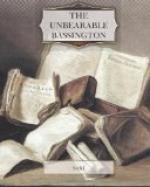Staring dumbly out at the toiling sweltering human ant-hill Comus marvelled how missionary enthusiasts could labour hopefully at the work of transplanting their religion, with its homegrown accretions of fatherly parochial benevolence, in this heat-blistered, fever-scourged wilderness, where men lived like groundbait and died like flies. Demons one might believe in, if one did not hold one’s imagination in healthy check, but a kindly all-managing God, never. Somewhere in the west country of England Comus had an uncle who lived in a rose-smothered rectory and taught a wholesome gentle-hearted creed that expressed itself in the spirit of “Little lamb, who made thee?” and faithfully reflected the beautiful homely Christ-child sentiment of Saxon Europe. What a far away, unreal fairy story it all seemed here in this West African land, where the bodies of men were of as little account as the bubbles that floated on the oily froth of the great flowing river, and where it required a stretch of wild profitless imagination to credit them with undying souls. In the life he had come from Comus had been accustomed to think of individuals as definite masterful personalities, making their several marks on the circumstances that revolved around them; they did well or ill, or in most cases indifferently, and were criticised, praised, blamed, thwarted or tolerated, or given way to. In any case, humdrum or outstanding, they had their spheres of importance, little or big. They dominated a breakfast table or harassed a Government, according to their capabilities or opportunities, or perhaps they merely had irritating mannerisms. At any rate it seemed highly probable that they had souls. Here a man simply made a unit in an unnumbered population, an inconsequent dot in a loosely-compiled deathroll. Even his own position as a white man exalted conspicuously above a horde of black natives did not save Comus from the depressing sense of nothingness which his first experience of fever had thrown over him. He was a lost, soulless body in this great uncaring land; if he died another would take his place, his few effects would be inventoried and sent down to the coast, someone else would finish off any tea or whisky that he left behind—that would be all.
It was nearly time to be starting towards the next halting place where he would dine or at any rate eat something. But the lassitude which the fever had bequeathed him made the tedium of travelling through interminable forest-tracks a weariness to be deferred as long as possible. The bearers were nothing loth to let another half-hour or so slip by, and Comus dragged a battered paper-covered novel from the pocket of his coat. It was a story dealing with the elaborately tangled love affairs of a surpassingly uninteresting couple, and even in his almost bookless state Comus had not been able to plough his way through more than two-thirds of its dull length; bound up with the cover, however, were some pages of advertisement,




